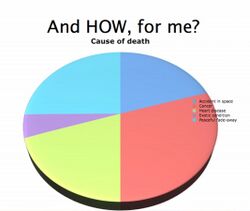Genes and other strangers
| Project Infobox | |
|---|---|
| Self researcher(s) | Esther Dyson |
| Related tools | 23andMe, Fitbit |
| Related topics | Chronic disease, Genome and microbiome |
Builds on project(s) |
|
| Has inspired | Projects (0) |
| Show and Tell Talk Infobox | |
|---|---|
| Featured image | 
|
| Date | 2012/09/15 |
| Event name | 2012 QS Global Conference |
| Slides | |
| This content was automatically imported. See here how to improve it if any information is missing or out outdated. |
Genes and other strangers is a Show & Tell talk by Esther Dyson that has been imported from the Quantified Self Show & Tell library.The talk was given on 2012/09/15 and is about Chronic disease, and Genome and microbiome.
Description[edit | edit source]
A description of this project as introduced by Quantified Self follows:
Esther Dyson is on the board of 23andme and she is also subject number three of the personal genome project. Her entire genome is up online. In this talk, she discusses how genome can help you perhaps predict when you will be dead. She tries to point out in that your genetics matter a lot, for example 70%-80% of your risk for getting Type 1 Diabetes is genetically pre-determined.
Video and transcript[edit | edit source]
A transcript of this talk is below:
QS Conference 2012-Esther Dyson
Genes and other strangers
I’m Esther Dyson. I’m on the board of 23andme and I’m also subject number three of the personal genome project. My entire genome is up online and I’m happy to talk about it later in the Q and A. my talk is actually a fewer slides than most people’s. People ask do I really want to know this stuff, so this is what I tell them. Here’s a chart that in the end anything else you find out is going to be inside that pie chart. There’s not 300% of different ways to die. Your genome can help you perhaps predict when, but in the end you’re never going to find out anything worse than you will be dead. Of course, it is interesting to know how and this is about what’s useful for me. Fortunately I’ve lowered my risk of dying from everything else because I have a 25% risk of dying in space and that pro rata reduces everything else. So this is what 23andme thinks, and note of course these are not percentages of what you die of, but percentages of what you might get. And the first ones showed the things that were higher than average. These show the things that are lower than average, but note being above or below average isn’t as interesting as the absolute risk. And it’s also important to note what I’m trying to point out here, which is something’s are your genetics matter a lot, like Type 1 diabetes as you see here on the left, something like 70 or 80% of your risk is genetically determined. You also get it early. Type 2 diabetes may present similarly but it’s a completely different phenomenon and infact it depends on a lot more on your lifestyle. I got my data that wasn’t terribly surprising that I am trying to change my odds. And here you see different other things I track and now that 23andme has an API, and Fitbit does and everybody else, someday with luck I can put them all together and see how one thing effects another thing. Personally I travel a lot and I love circadian rhythms but I’m trying to get these different things to adjust to Moscow time is pretty challenging. A couple of years ago I discovered a big lump in my breast and I spent two very interesting months looking at that chart reassessing my odds. It turned out to be benign so then my odds went back to what they were originally. The point of this is the odds of things happening are you know in the end do or don’t do something, get something, be something. Moving on, why should you find out your genome? It doesn’t really tell you that much, and as you saw my odds went all over the place with the same genome. Early users or benefactors; we’re providing information for research. We’re not getting as much as we hoped. Now, this is what your genome actually is, unless you’re a really smart scientist. It’s unintelligible and it’s very very long. All we have right now is a 100 word glossary. So you see these little bits, little snips that indicate some connection to something. But yes, breast cancer, you see that word in there interferes with – but then we don’t really have a grammar for understanding the genome. That is epigenetics; the understanding the interrelations of these things; there’s lots of stuff missing. I think it was yesterday you saw Larry Smars similar thing. His was Crone’s disease and I can’t even remember what this is for, but they don’t necessarily add. They don’t necessarily multiple. We just don’t know what they do. You can see how they compare with the relative. You can even see where your genome is identical; that’s my brother there where it’s different but you still don’t know what it means. You can see how close you are to all your other siblings, aunts and uncles and so forth. Yeah, it’s sort of narcissistic but at least it’s educational. And there are a few things that may infact be meaningful in real time, using your genome as a diagnostic for certain diseases, and as to help you understand how you might metabolize certain drugs. And with that I’m going to go to the part that I too like best which is the Q and A.
Thank you.
About the presenter[edit | edit source]
Esther Dyson gave this talk.